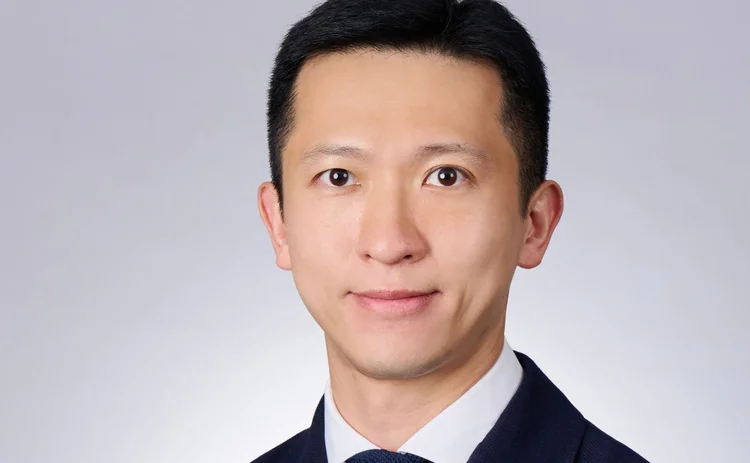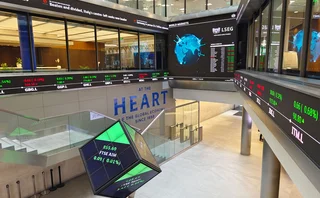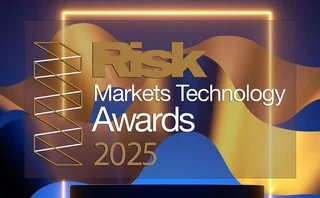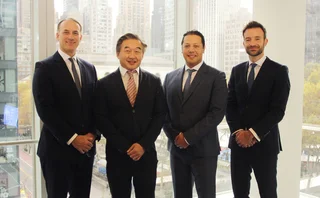
Derivatives house of the year, Hong Kong: Crédit Agricole CIB
Asia Risk Awards 2023

As a French bank with a strong presence in the Hong Kong market, Crédit Agricole CIB was quick to spot the dislocation in the European fixed-income market that started to emerge mid-2022, when the gap between term repo rates and government bond yields diverged.
“We are very strong in terms of the European repo market and we are also a major player in the European government bond market, so we see different types of market participants,” says Leon Lam, head of global markets for Hong Kong and head of structuring and solutions sales for Asia-Pacific and the Middle East at Crédit Agricole CIB in Hong Kong.
For example, if the yield on a certain European government bond was 1.5% and the repo rate was 1.7%, then the French bank would be able to capture the 20-basis point spread for clients – providing of course that neither the bond nor Crédit Agricole CIB defaulted before the maturity of the investment.
To capture this basis for Asian clients, the team in Hong Kong developed a structure through which clients executed a repo trade, with the appropriate financing in place, while at the same time shorting the underlying bond.
This trade has proved hugely popular with Hong Kong clients – as well as clients from mainland China, Singapore, Korea and Japan. Crédit Agricole CIB says that the amount traded so far has been “significant”.
“This is not a one-off trade. This is a recurring and a scalable trade,” says Lam. “Clients like this type of trade, especially in these volatile market conditions, because they are taking a non-directional position where they know they will be able to capture a certain spread.”
This trade is also available in many different formats, as Lam explains.
“We can do the trade as a total return swap, as a bond forwards, as a principal-protected note. It all depends on the requirements of our clients,” says Lam.
On top of this, the Hong Kong structuring team is also able to support investors that want to tap into this opportunity using local Nafmii master agreements.
“This is a highly tailorable product that we can offer in many different variations. This trade really demonstrates the innovative value that, as a European bank, we can bring to the market in Hong Kong,” says Lam.
Cross-border infrastructure pioneers
One of the reasons the trade has proved so popular with Asian clients this year is because the relative value of China’s fixed-income markets has been in decline over this period.
As a result, investors from the mainland have been eager to access overseas markets. Crédit Agricole, perfectly positioned in Hong Kong and with a strong European pedigree, has been happy to oblige.
“We have been a pioneer in all the cross-border infrastructure programmes, particularly the southbound Bond Connect launched in 2021 and then Swap Connect earlier this year,” says John Luk, head of trading for greater China. “We see the trend from the market that capital is investing in the offshore market to capture higher yields.”
Luk says that in the second half of last year, Crédit Agricole CIB issued a significant amount of CNH bond issuance to investors from the mainland, largely due to rising interest rates widening the price gap between onshore and offshore renminbi.
Crédit Agricole CIB says it issued a “significant” volume of notes through the southbound Bond Connect to Chinese investors in 2022, and expects that volumes this year will be even higher.
“We have perfectly positioned ourselves as a channel for our international clients to access the Chinese onshore market, as well as a channel for onshore investors to tap into the offshore markets,” says Lam. “This is a clear strength our Hong Kong business has brought to the markets this year.”
Sustainability credentials
No appraisal of Crédit Agricole CIB would ever be complete without touching on what they are doing within the field of environmental, social and governance (ESG) – an area the bank continues to make big strides in every year.
“We have positioned ourselves globally as an ESG bank, and we have been keen to extend these credentials to Hong Kong,” says Lam.
The past 12 months has seen the French bank involved in a couple of firsts when it comes to ESG in Hong Kong.
In February, Crédit Agricole CIB participated in the issuance of Hong Kong’s first tokenised green bond, conducted under the Green Bond Framework that the government had set up. This bond was distributed by a four-bank syndicate, two of which also acted as investor custodians. End investors had to have a custody relationship with one of these two banks to participate in the trade.
The French bank also executed the first dual-tranche Hong Kong dollar and CNH social bond issued by a quasi-sovereign investor. This was done on behalf of the Hong Kong Mortgage Corporation and was intended to support local businesses that had been impacted by the Covid-19 pandemic, helping to ease the financial burden of paying employee wages and rents. HKMC issued a total of HK$8 billion (US$1 billion) in this way, plus an additional CNH tranche amounting to US$411 million.
“We have a dedicated ESG team in Hong Kong. This supports our position as a regional hub, capable of executing a wide range of structures for a diverse client base,” says Lam.
Luk adds that the bank remains committed to the Hong Kong market, as evidenced by a string of new senior hires over the past 12 months.
“A very important point that we really need to emphasise is our commitment to Hong Kong. Most of our regional managers are located here. We managed to continue to grow our local team through new hires, even during the very challenging time of Covid-19. And we have been supporting the local initiatives of the Hong Kong government, the Hong Kong Stock Exchange and the Chinese regulators.”
Only users who have a paid subscription or are part of a corporate subscription are able to print or copy content.
To access these options, along with all other subscription benefits, please contact info@risk.net or view our subscription options here: http://subscriptions.risk.net/subscribe
You are currently unable to print this content. Please contact info@risk.net to find out more.
You are currently unable to copy this content. Please contact info@risk.net to find out more.
Copyright Infopro Digital Limited. All rights reserved.
As outlined in our terms and conditions, https://www.infopro-digital.com/terms-and-conditions/subscriptions/ (point 2.4), printing is limited to a single copy.
If you would like to purchase additional rights please email info@risk.net
Copyright Infopro Digital Limited. All rights reserved.
You may share this content using our article tools. As outlined in our terms and conditions, https://www.infopro-digital.com/terms-and-conditions/subscriptions/ (clause 2.4), an Authorised User may only make one copy of the materials for their own personal use. You must also comply with the restrictions in clause 2.5.
If you would like to purchase additional rights please email info@risk.net
More on Awards
Clearing house of the year: LCH
Risk Awards 2025: LCH outshines rivals in its commitment to innovation and co-operation with clearing members
Best use of machine learning/AI: CompatibL
CompatibL’s groundbreaking use of LLMs for automated trade entry earned the Best use of machine learning/AI award at the 2025 Risk Markets Technology Awards, redefining speed and reliability in what-if analytics
Markets Technology Awards 2025 winners’ review
Vendors jockeying for position in this year’s MTAs, as banks and regulators take aim at counterparty blind spots
Equity derivatives house of the year: Bank of America
Risk Awards 2025: Bank gains plaudits – and profits – with enhanced product range, including new variants of short-vol structures and equity dispersion
Law firm of the year: Linklaters
Risk Awards 2025: Law firm’s work helped buttress markets for credit derivatives, clearing and digital assets
Derivatives house of the year: UBS
Risk Awards 2025: Mega-merger expected to add $1 billion to markets revenues, via 30 integration projects
Interest rate derivatives house of the year: JP Morgan
Risk Awards 2025: Steepener hedges and Spire novations helped clients navigate shifting rates regime
Currency derivatives house of the year: UBS
Risk Awards 2025: Access to wealth management client base helped Swiss bank to recycle volatility and provide accurate pricing for a range of FX structures







